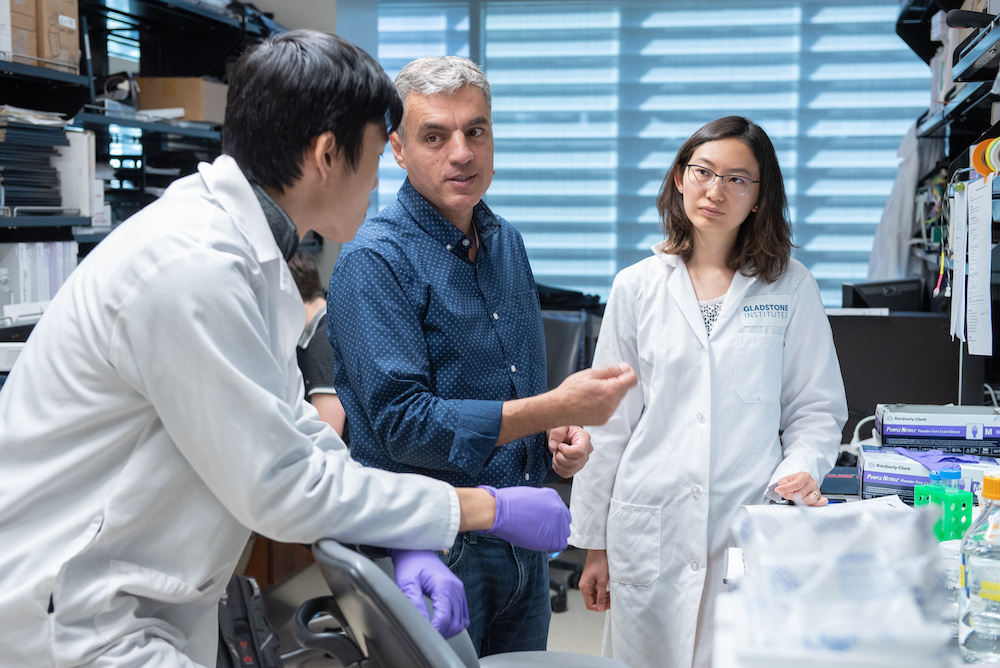Jorge Palop’s lab aims to understand the neural processes underlying cognitive decline in Alzheimer's disease and neurological conditions, such as epilepsy, autism, and schizophrenia. His team focuses on a type of neuron that stabilizes neuronal networks in the brain, called inhibitory interneurons, and the role they may play in the cognitive dysfunction and abnormal patterns of neuronal network activity that accompany Alzheimer’s disease. Ultimately, Palop’s group aims to define the mechanisms of cognitive dysfunction at the molecular, circuit, and network level, as well as to develop novel therapeutic approaches to restore brain functions in Alzheimer’s disease.
Disease Areas
Areas of Expertise

Lab Focus
Research Impact
Palop discovered that mice genetically engineered to simulate Alzheimer's disease (by producing excess beta-amyloid protein) develop aberrant patterns of neuronal network activity, including abnormal synchronisation and seizures. These patterns resemble the epileptic symptoms observed in many patients with early-onset familial Alzheimer’s disease, the hyperactivation of neuronal networks detected in patients with sporadic Alzheimer’s disease, and in non-demented people who carry amyloid deposits.
Palop and his team found that in Alzheimer’s mouse models, these symptoms could be attributed to the alteration of inhibitory interneurons. Importantly, they showed that by supplying genetically modified interneurons in the brain of Alzheimer’s mice, or by chemically enhancing the function of resident interneurons, they could restore the cognitive functions and brain oscillatory rhythms in these mice. The findings pave the way for therapeutic interventions targeting the function of inhibitory interneurons, which the lab is currently pursuing through a combination of cell-based and pharmacological approaches.
Professional Titles
Associate Investigator, Gladstone Institutes
Associate Professor, Department of Neurology, UC San Francisco
Bio
Jorge J. Palop is an associate investigator at the Gladstone Institutes. He is also an associate professor of neurology at UC San Francisco (UCSF).
Palop has received numerous competitive honors and awards, including predoctoral and postdoctoral fellowships from the Spanish Ministry of Education and Science, the Fulbright program, the Hillblom Center for the Biology of Aging, and the Memory and Aging Center at UCSF, as well as the Ramon y Cajal and the S.D. Bechtel Young Investigator Awards. He has published his findings and reviews in many prestigious scientific journals, including Cell, Nature, Science, Nature Medicine, Neuron, Nature Neuroscience, PNAS, and The Journal of Neuroscience.
He regularly serves as a scientific reviewer for many of these journals and other organizations. He is a reviewing editor of eNeuro, the open-access online journal of the Society of Neuroscience. Palop earned a PhD in neuroscience (summa cum laude) from the University of Valencia, Spain. He did his postdoctoral training at UCSF and in the laboratory of Lennart Mucke at Gladstone.
Why Are You Dedicated to Discovery?
“I’m fascinated by the biological processes that underlie cognition; I think that understanding those processes at the cellular and network level will lead to real breakthroughs in how we treat cognitive decline in neurological diseases.”
Honors and Awards
2016 UCSF Neuroscience Graduate Program, UC San Francisco
2016 UCSF Biomedical Sciences Graduate Program, UC San Francisco
2015 Keynote speaker, 1st National Hispanic Alzheimer’s Conference, San Antonio
2014 Reviewing Editor, eNeuro
2014 New Investigator R01, National Institute of Aging (NIH)
2013 Early Career Review program for the National Institutes of Health
2013 Investigator Initiated Research Grant, Alzheimer’s Association
2008 Ramón y Cajal Investigator Award, the Spanish Science and Education Ministry
2008 S.D. Bechtel Young Investigator Award
2006 McBean Postdoctoral Fellowship, Memory and Aging Center, UC San Francisco
2003 C. Lester and Audrey Hogan Fellowship Award
2003 Postdoctoral Fellowship, Hillblom Center for the Biology of Aging, UC San Francisco
2001 Postdoctoral Fellowship, Spanish Science and Education Ministry
2001 Fulbright Postdoctoral Fellowship
1997 Master Fellowship of the International University of Andalucia, Spain
1996 Predoctoral Fellowship, Spanish Science and Education Ministry
Publications
Contact
Jorge Palop
Email
415.734.2661
Theodora Pak
Executive Administrator
415.734.2513
Email

